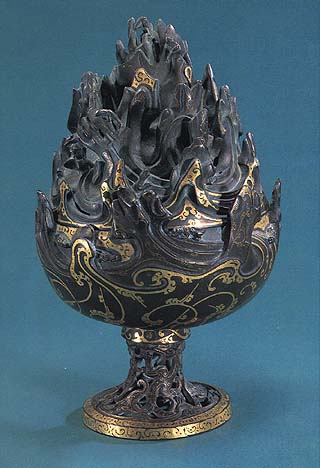A 160 Pound Bone Hammer!
/ The quest for power is endless.
The quest for power is endless.However; we all know that no matter how frivolous or fruitless the quest for power becomes, people will still seek it.
The sacrifices we make in the pursuit of power are not small, and the likelihood of eventually becoming possessed is high. That's what power does, it possesses.
This is true of all sorts of power, including the most basic type: physical power. That's why demons in Chinese art are so often shown with "great" muscle definition.
Daoist precepts, which preclude the invention of internal martial arts, strongly discourage the development of physical power. Why? Because these precepts require us to be honest about just how strong we actually are-- from the beginning!
It is only through the quest for power that we come to think of ourselves as weak, or insufficient. Humans are naturally very strong.
Pure internal martial arts completely discard the idea of muscle force. They completely discard the idea that any form of exertion is necessary to generate force.
My hand, balled up into a tight fist, is mostly bone. So is my elbow, and so is the heal of my foot. I weigh a little under 160 pounds. If I can move, propel, rotate or swing my entire body weight and strike an opponent with all one hundred and sixty pounds concentrated at a single point, using my bony fist--what need do I have for muscle strength?
Even a 40 pound bone hammer can bring down most men with a single blow. Don't even waste your energy trying to image a 160 pound bone hammer, it's just too much force.
Relatively speaking, force generated from muscle exertion is pretty wimpy.
If you get possessed by the idea of being able to generate a lot of force; consider that time spent trying to move freely as a single integrated unit has a much bigger pay off than any muscle-force training.
A 160 pound bone hammer pay off.
Note: This post is a riff on Master George Xu's recient claim that he is a 160 pound bone hammer!
Second Note: The picture at the top of this post is from the Film "Hebrew Hammer," very funny, I recommend it! Shana Tova!!! (Yom Kippur starts tonight.)
And also I forgot to wish everyone a happy Double Nine Day (last Sunday)--It's Daoist New Year!!! and it's traditional to eat venison.

 I'm hooked on stick-on moxa! These little sticky hexagrams with a tiny cylinder of moxa attached are so easy to use. I've always loved moxa but I never liked to do it in my own home because of all the smoke. So sometimes I did it outside on the front or back steps, but that's no fun when it's cold or windy (most days in San Francisco).
I'm hooked on stick-on moxa! These little sticky hexagrams with a tiny cylinder of moxa attached are so easy to use. I've always loved moxa but I never liked to do it in my own home because of all the smoke. So sometimes I did it outside on the front or back steps, but that's no fun when it's cold or windy (most days in San Francisco).
 Shrinking and expanding, or shrinking and pouncing, is something every predator does. If you want to develop martial arts skill you must replace bending and stretching with shrinking and expanding.
Shrinking and expanding, or shrinking and pouncing, is something every predator does. If you want to develop martial arts skill you must replace bending and stretching with shrinking and expanding. I went over to Master George Xu's house yesterday to work on a writing project.
I went over to Master George Xu's house yesterday to work on a writing project. No, the Internal Martial Arts were developed by people who had already cultivated a subtle body; a weak, sensitive, feminine (yes I said that), humble, yielding, and desireless physicality. A body cultivated with the idea that lack of pretense is not only a moral way of being; but a moral way of moving.
No, the Internal Martial Arts were developed by people who had already cultivated a subtle body; a weak, sensitive, feminine (yes I said that), humble, yielding, and desireless physicality. A body cultivated with the idea that lack of pretense is not only a moral way of being; but a moral way of moving.